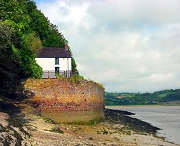| Welsh Greats & Dylan Thomas: A Poet at War |
Television Arts Feature |
| Two Dylan Thomas Documentaries , BBC Cymru Wales & Cwmni Da-S4C , October 13, 2014 |
 ‘Welsh Greats’ from BBC Cymru Wales is a workable and useful documentary on the life in its entirety. Director Dafydd O'Connor has passed on the use of a presenter- never a good idea- but has secured the service of Matthew Rhys for narration. The range of interviewees marries archive material, Caitlin Thomas and John Ormond, with present day commentators. Jeff Towns, Hannah Ellis, Gwen Watkins, biographers Paul Ferris and Andrew Lycett all contribute. Julia Cleverdon tells that ‘Under Milk Wood’ probably only exists by virtue of her father’s strong-mindedness. Producer Douglas Cleverdon locked the author up for the night and forced it out of him.
‘Welsh Greats’ from BBC Cymru Wales is a workable and useful documentary on the life in its entirety. Director Dafydd O'Connor has passed on the use of a presenter- never a good idea- but has secured the service of Matthew Rhys for narration. The range of interviewees marries archive material, Caitlin Thomas and John Ormond, with present day commentators. Jeff Towns, Hannah Ellis, Gwen Watkins, biographers Paul Ferris and Andrew Lycett all contribute. Julia Cleverdon tells that ‘Under Milk Wood’ probably only exists by virtue of her father’s strong-mindedness. Producer Douglas Cleverdon locked the author up for the night and forced it out of him. The film is crisply edited, following the trajectory from boyhood to school magazine editor to the publishing of ‘18 Poems’. The first collection is published, at the poet’s insistence, without photo or blurb. The meetings with Pamela Hansford Johnson and Augustus John follow and the film tracks the life’s locations from ‘the Wheatsheaf’ to the New Forest to Laugharne. Extracts from the most celebrated poems are heard in that unmistakable voice. An interviewee reveals that the speaking voice, a light tenor in private, wholly differed from the public voice. The film does not shrink from the flaws. The marriage entailed acts of physical violence. Parenting was remote and occasional. Gwen Watkins states that as a person Thomas remained quite immature. Although alcohol featured early on it did not include spirits. They only arrive with the celebrity in the USA. John Ormond reveals that the poet was haunted by death, Thomas saying to him ‘I die every night and when I wake again in the morning well that's a bonus’. The film’s editor concludes with an interviewee quotation that is simply bizarre. ‘He was a great writer. And that's what we forget.’ This year is one of unceasing celebration so what is he talking about? ‘Welsh Greats’ makes a brief mention of the Thomas-scripted film from wartime ‘Green Mountain Black Mountain.’ ‘Dylan Thomas: A Poet at War’ homes in fascinatingly on this aspect of the biography. Director Euros Glyn’s film comes with the advantage of a presenter who gives visual punch, conviction and continuity. It is adroitly written by Ifor ap Glyn. The poet’s voice is done by that now practised hand, actor Rhodri Miles. The Thomas interest in film is traced back to the teenage years. He is passionate about Garbo and is author aged fifteen of an article in the school magazine that looks closely at the editing techniques of D W Griffith. The film muses about Thomas’ politics. The script calls his friend Bert Trick a communist- nothing unusual in that in the years before Stalin’s Nazi alliance- although Trick’s son declares that his father was a lifelong Labour member. Academic John Goodby is asked whether Thomas might have been considered a pacifist. He weighs it up with care and a response ‘yes, in certain ways’. Wartime service in the forces does not happen due in part to the poet’s arrival at the selection process soused in alcohol. His wartime is spent with Strand Films, a London film-maker producing seventy films annually. His salary is a decent eight pounds a week, later rising to ten. He scripts or co-scripts at least fifteen films for the wartime government. Jamie Medhurst of Aberystwyth University, with his huge knowledge of films of the period, provides the context, and the clips from the Thomas films are absorbing. A first scene shows a group of women tethering a dirigible. ‘New Towns for Old’ is infused with the spirit of Beveridge a year before the Report's publication. ‘These are the Men’ does a re-cut of Leni Riefenstahl and the script adds a satirical voice-over to speeches of the Nazi leaders. ‘Our People’ is propelled by a script of emotional verse. The reviews are commendatory. ‘Our Country’ is premiered in 1944 at the prestigious venue of the Empire Leicester Square. There is the occasional flurry with the wartime censor. ‘Wales: Green Mountain, Black Mountain’ is a companion piece to similar films on Scotland and Ireland but has the censor wondering if Thomas is ‘a proper Welshman’. An interviewee recalls a memory of Thomas lying in a bath eating dolly mixtures and devouring the latest Agatha Christie. ‘Dylan Thomas: A Poet at War’ moves to its conclusion, that the wartime work has to be understood as crucial to the life. It is reflection of his absorption in, and love for, popular culture. Thomas never had much time for the avant-garde interests of contemporary poets; the intention of the verse like the films was to bring poetry into the popular realm. ‘Dylan Thomas: A Poet at War’ is model of clarity and exposition that fills a genuine gap in the understanding of the life. This article first appeared in Wales Arts Review. |
Reviewed by: Adam Somerset |
This review has been read 517 times There are 28 other reviews of productions with this title in our database:
|
